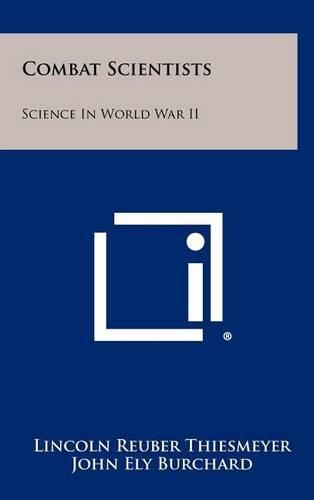Readings Newsletter
Become a Readings Member to make your shopping experience even easier.
Sign in or sign up for free!
You’re not far away from qualifying for FREE standard shipping within Australia
You’ve qualified for FREE standard shipping within Australia
The cart is loading…






Combat Scientists: Science In World War II is a non-fiction book written by Thiesmeyer and Lincoln Reuber. The book explores the role of science in the Second World War, specifically how it was used to develop new weapons, tactics, and strategies. The authors delve into the various scientific disciplines that were utilized during the war, including physics, chemistry, biology, and engineering. They also examine the work of prominent scientists who contributed to the war effort, such as Robert Oppenheimer, who led the Manhattan Project to develop the atomic bomb. The book provides a detailed account of the scientific breakthroughs and innovations that helped shape the war and its outcome. It also highlights the ethical issues surrounding the use of science in warfare and the impact it had on society. Overall, Combat Scientists: Science In World War II is a comprehensive and engaging read that sheds light on the crucial role of science in one of the most significant events in human history.Foreword By Karl T. Compton.This scarce antiquarian book is a facsimile reprint of the old original and may contain some imperfections such as library marks and notations. Because we believe this work is culturally important, we have made it available as part of our commitment for protecting, preserving, and promoting the world's literature in affordable, high quality, modern editions, that are true to their original work.
$9.00 standard shipping within Australia
FREE standard shipping within Australia for orders over $100.00
Express & International shipping calculated at checkout
Combat Scientists: Science In World War II is a non-fiction book written by Thiesmeyer and Lincoln Reuber. The book explores the role of science in the Second World War, specifically how it was used to develop new weapons, tactics, and strategies. The authors delve into the various scientific disciplines that were utilized during the war, including physics, chemistry, biology, and engineering. They also examine the work of prominent scientists who contributed to the war effort, such as Robert Oppenheimer, who led the Manhattan Project to develop the atomic bomb. The book provides a detailed account of the scientific breakthroughs and innovations that helped shape the war and its outcome. It also highlights the ethical issues surrounding the use of science in warfare and the impact it had on society. Overall, Combat Scientists: Science In World War II is a comprehensive and engaging read that sheds light on the crucial role of science in one of the most significant events in human history.Foreword By Karl T. Compton.This scarce antiquarian book is a facsimile reprint of the old original and may contain some imperfections such as library marks and notations. Because we believe this work is culturally important, we have made it available as part of our commitment for protecting, preserving, and promoting the world's literature in affordable, high quality, modern editions, that are true to their original work.